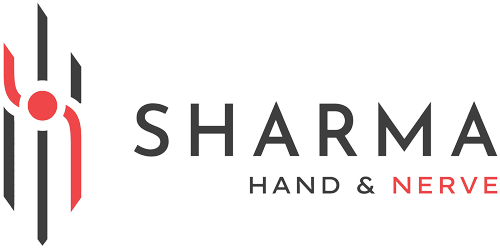Shoulder pain, weakness, or numbness can make everyday movement a challenge. Whether you’re suffering from brachial plexus injury, thoracic outlet syndrome, shoulder impingement, or nerve entrapment, there are real solutions available. Dr. Ketan Sharma understands how nerve issues affect your quality of life—and he’s here to help you regain control with expert care.
What are nerve-related conditions
that can affect the shoulders?
The shoulder region is a complex intersection of nerves originating primarily from the brachial plexus—a network of nerves that stems from the cervical spine (C5-T1) and controls sensation and movement in the shoulder, arm, and hand. These nerves pass through narrow anatomical spaces and are vulnerable to compression, traction injuries, or trauma, which can lead to pain, weakness, or dysfunction. Because of the shoulder’s wide range of motion and its reliance on nerve signals, even minor issues can have a significant impact. Several nerve-related conditions can impact the shoulders, including:
- Brachial plexus injury causing weakness, numbness, or paralysis of the shoulder and arm
- Thoracic outlet syndrome due to compression of nerves between the collarbone and first rib
- Suprascapular nerve entrapment leading to pain and muscle wasting in the shoulder blade
- Axillary nerve injury affecting shoulder abduction and deltoid muscle function
- Long thoracic nerve palsy causing scapular winging and shoulder instability
- Cervical radiculopathy from nerve root compression in the neck radiating into the shoulder
- Parsonage-Turner syndrome (neuralgic amyotrophy) triggering sudden, severe shoulder pain
- Peripheral nerve tumors or cysts compressing the surrounding nerve structures
- Post-surgical or post-traumatic nerve entrapment following shoulder injuries or repairs
- Chronic nerve compression due to repetitive overhead activity or poor shoulder mechanics
- Pectoralis minor tightness causing impingement and weakness when raising or elevating the shoulder

What are the signs & symptoms of shoulder nerve dysfunction?
When nerves in the shoulder region become compressed, irritated, or injured, they can disrupt the normal flow of signals between the spinal cord and the muscles of the shoulder, arm, and upper back. This often leads to a variety of sensory and motor symptoms. Common signs and symptoms of shoulder nerve dysfunction may include:
- Persistent shoulder pain that radiates into the arm or neck
- Numbness or tingling in the shoulder, arm, or upper back
- Muscle weakness, especially when lifting or rotating the arm
- Shoulder blade (scapular) winging or instability
- Burning or electric shock-like sensations in the shoulder region
- Difficulty with overhead or repetitive shoulder movements
- Loss of coordination or fine motor control in the upper limb
- Visible muscle wasting around the shoulder or upper arm
- Increased pain with certain neck or arm positions
- Reduced range of motion in the shoulder joint
What are the treatments for shoulder nerve dysfunction?
Treating shoulder nerve dysfunction begins with an accurate and detailed diagnosis. Dr. Sharma takes a hands-on, exam-focused approach to identify the specific nerve involved, the source of compression or injury, and how it’s affecting your daily life. He often evaluates your symptoms through a comprehensive physical exam—something he believes is a lost art in modern medicine—alongside necessary imaging or nerve studies. Once the diagnosis is clear, Dr. Sharma curates a personalized treatment plan tailored to your specific condition and goals. Depending on the underlying cause, your treatment plan may include:
- Conservative therapy, such as physical therapy and activity modification
- Targeted nerve blocks or injections to reduce inflammation and pain
- Surgical nerve decompression to relieve pressure on affected nerves
- Nerve repair or grafting in cases of traumatic nerve injury
- Tendon or muscle transfers to restore function in cases of permanent nerve damage
- Treatment of associated structural problems, such as bone spurs or scar tissue
- Postoperative rehabilitation to regain strength and shoulder mobility
Why choose Dr. Sharma for shoulder conditions?
Dr. Ketan Sharma is a board-certified hand and nerve surgeon with fellowship training in complex peripheral nerve surgery. He specializes in diagnosing and treating nerve-related shoulder conditions that are often overlooked. With a strong background in neuroscience from Johns Hopkins and surgical training from top institutions like Duke and Washington University, Dr. Sharma brings surgical precision and compassion to every patient case. He is committed to helping you move freely and live without pain again.
Here’s why patients trust Dr. Sharma with their shoulder care:
- Expertise in brachial plexus and peripheral nerve surgery
- Over 600 complex nerve and pain procedures performed annually
- Emphasis on hands-on physical examination to uncover hidden diagnoses
- Personalized treatment plans grounded in functional recovery
- Collaborative care approach with referring physicians and therapists
If you’re ready to find real answers and long-lasting relief, schedule a consultation with Dr. Sharma for expert shoulder treatment today.
